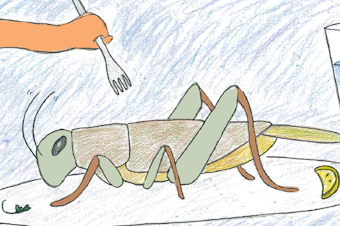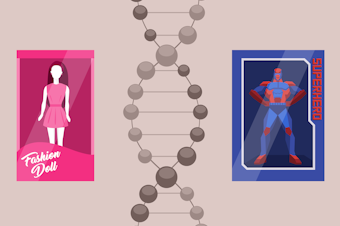Hidden Brain
Hidden Brain helps curious people understand the world – and themselves. Using science and storytelling, Hidden Brain reveals the unconscious patterns that drive human behavior, and the biases that shape our choices.
Sponsored
Episodes
-

Radio Replay: Yum and Yuck
Paul Rozin has been studying the psychology and culture of food for more than 40 years. And he's come to appreciate that food fills many of our needs, but hunger is just one. On this week's Radio Replay, we chew over the profound role that food plays in our lives. Then, we spit it all out — we study the ick factor that turns us off to cockroaches, skunks, and poop. Rachel Herz explains the sensation of disgust, and why it doesn't always come naturally. For more information about the research in this episode, visit https://n.pr/2UTf1p0.
-

Alan Alda Wants Us To Have Better Conversations
Arguments and bickering can sour family gatherings during the holiday season. This week, we share tips on how to avoid miscommunication from our January 2018 conversation with actor Alan Alda. You might know him from his roles on television shows like M*A*S*H, The West Wing and 30 Rock, but in recent years Alda has also focused on helping scientists, and the rest of us, communicate better. His book is If I Understood You, Would I Have This Look on My Face? My Adventures in the Art and Science of Relating and Communicating.
-

Yum and Yuck: The Psychology Of What We Eat...And What We Spit Out
This week on the Hidden Brain radio show, we dig into the culture and psychology that determines the foods that make us salivate and the scents that make us squirm.
-

Starving The Watchdog: Who Foots The Bill When Newspapers Disappear?
When a newspaper shuts down, there are obvious costs to the community it serves: job losses, fewer local stories. But new research suggests there's another consequence that's harder to spot—one that comes with a hefty price tag for residents. This week on Hidden Brain we ask, who bears the cost when nobody wants to pay? For more information about the research in this episode, visit https://n.pr/2zSPraS.
-

Spoiler Alert! The Psychology Of Surprise Endings
Why do we always fall for surprise endings? It turns out that our capacity to be easily fooled in books and movies is made possible by a handful of predictable mental shortcuts. We talk this week with Vera Tobin, one of the world's first cognitive scientists to study plot twists. She says storytellers have been exploiting narrative twists and turns for millennia — and that studying these sleights of hand can give us a better understanding of the contours of the mind.
-

A Founding Contradiction: Thomas Jefferson's Stance On Slavery
"We hold these truths to be self-evident, that all men are created equal." These words, penned by Thomas Jefferson more than 240 years ago, continue to inspire many Americans. And yet they were written by a man who owned hundreds of slaves, and fathered six children by an enslaved woman. This week, we talk with Pulitzer Prize-winning historian Annette Gordon-Reed about the contradictions in Jefferson's life — and how those contradictions might resonate in our own lives.
-

Radio Replay: Bringing Up Baby
This week we focus on the behavior of the youngest members of the human race. We try to translate the mysterious language of babies. And we ask, when should we step back and just let our children be? For more information about the research in this episode, visit https://n.pr/2TuxEz3.
-

Nature, Nurture, And Our Evolving Debates About Gender
Gender is one of the first things we notice about the people around us. But where do our ideas about gender come from? Can gender differences be explained by genes and chromosomes, or are they the result of upbringing, culture and the environment? In this encore episode from October 2017, we delve into debates over nature vs. nurture, and meet the first person in the United States to officially reject the labels of both male and female, and be recognized as "non-binary."
-

Zipcode Destiny: The Persistent Power Of Place And Education
There's a core belief embedded in the story of the United States: the American Dream. The possibility of climbing the economic ladder is central to that dream. This week we speak with Raj Chetty, one of the most influential economists alive today, about the state of economic mobility in the U.S. and whether the notion of the American Dream is still useful. For more information about the research in this episode, visit https://n.pr/2z8cvSs.
-

Sounds Like A Winner: What Voices Have To Do With Politics
We're used to the idea that rhetoric sways voters. But what about another element of language: a candidate's voice? This week on Hidden Brain, what happens when our political system and ancient biological rules meet. For more information about the research in this episode, visit https://n.pr/2OZfuGQ.
-

Life, Death And The Lazarus Drug: Confronting America's Opioid Crisis
More than 70,000 people died of drug overdoses last year — many of them from heroin and other opioids. One of the most widely-used tools to confront this crisis is a drug called naloxone. It can reverse an opioid overdose within seconds, and has been hailed by first responders and public health researchers. But earlier this year, two economists released a study that suggested naloxone might be leading some users to engage in riskier behavior — and causing more deaths than it saves. This week, we talk with researchers, drug users, and families about the mental calculus of opioid use, and why there's still so much we're struggling to understand about addiction. For more information about the research in this episode, visit https://n.pr/2OZfuGQ.
-

Can A Child Be Raised Free Of Gender Stereotypes? This Family Tried
"Be the change you wish to see in the world." It's a popular quote that's made its way onto coffee mugs and bumper stickers — but it's not the easiest principle to live. On this week's Hidden Brain, we meet Royce and Jessica James, a couple who decided to raise their daughter in a gender-neutral way. It was far harder than they ever could have imagined. For further reading on children and gender norms, visit us at https://n.pr/2AmmiW1.